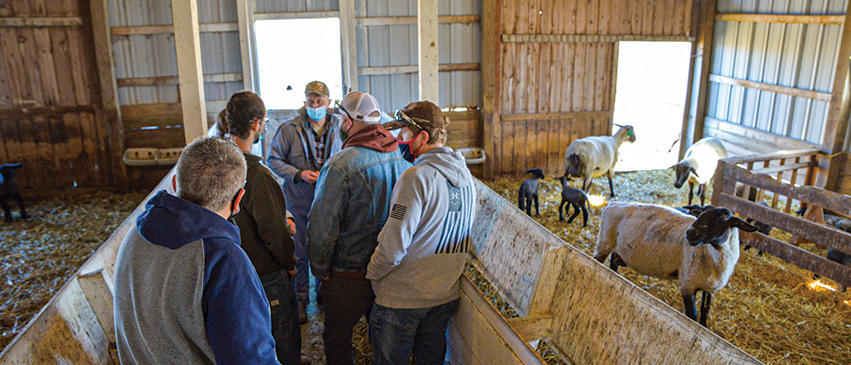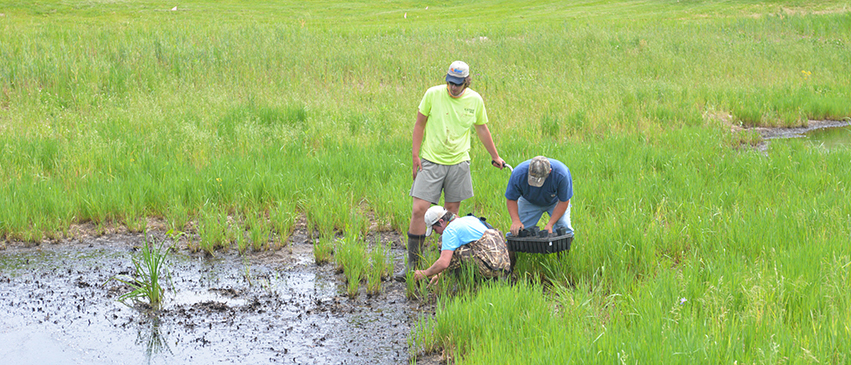Growing Central Illinois’ Agricultural Workforce

When you think of Greater Peoria’s key industries, healthcare and manufacturing typically come to mind. Agriculture, however, is another significant contributor to a robust economy within our region and state. In fact, Illinois’ agricultural commodities generate more than $19 billion annually, and Illinois is the third-largest state in the employment of farmers, ranchers and other agricultural managers, according to the U.S. Bureau of Labor Statistics. As the industry continues to innovate and evolve, Illinois Central College is committed to creating the next generation of agricultural workers—as well as conducting applied research to support local farmers and the regional ag ecosystem.
Producing new farmers, agronomists, soil and plant scientists, horticulturalists, precision agriculture technicians, and other agricultural workers is vital to our region for a couple reasons. First, farmers throughout the Midwest are an aging population. The 2017 ag census showed the average age of farm operators as 58—a full 10 years older than workers in most other sectors. Twenty-six percent are age 65 or older, while 12 percent are age 75 or older.
Second, increasing the number and diversity of students in agriculture and horticulture postsecondary programs is identified as an objective in the Greater Peoria Economic Development Council’s 2021-2025 Comprehensive Economic Development Strategy (CEDS) plan. This objective supports the plan’s strategy to “develop a supportive and equitable business development environment for beginning farmers and other enterprises sustainably utilizing or enhancing the region’s agricultural, water or other natural resources.”
Pioneering Agriculture Research
ICC has a strong history of pioneering agriculture research. It is a founding member of the Illinois Sustainable Ag Partnership, which explores new ag ecosystem markets, and one of nine Midwestern community colleges in the Community College Alliance for Agriculture Advancement (C2A3). The C2A3 collaboration was born of a mutual desire to provide ongoing education, training and demonstration projects to future farm producers and agricultural service providers—with the goal of improving the long-term health, productivity, resilience and sustainability of the soil. Developed with the U.S. Department of Agriculture Natural Resources Conservation Service (USDA-NRCS) and the USDA North Central Sustainable Agriculture Research and Education (USDA-SARE), it strives to ensure high-quality education, training of field practitioners, and applied regional research to increase productivity and the adoption of sustainable practices.
The USDA recently awarded ICC and other C2A3 member colleges the first-ever community college research grant from the NRCS. A key component of the agreement involves hands-on research and learning in the field, utilizing college land resources to expand best practices. ICC will utilize its Demonstration Farm on the East Peoria campus, which has expanded to include on-campus research plots and a constructed wetland, all on one tile system. The wetland captures drainage coming off the farm’s fields and naturally removes excess nutrients; students are then able to do water testing on the runoff. ICC, along with the Illinois Corn Growers Association, are monitoring the effectiveness of this practice.

“We have the great ability with the ICC Demonstration Farm to expose students to hands-on research on how these different practices tie to the environment, as well as how they affect agriculture. Everyone benefits from this: students, farmers and the community at large,” explains Pete Fandel, ICC professor of agriculture and Demonstration Farm project leader. “This partnership will help fund water testing from the wetland so we can produce solid, scientific data on how well wetlands reduce nutrient loss. I’m confident it will lead to substantial advancement in water quality and soil health research.”
Last year ICC, C2A3 and USDA-NRCS also signed a national memorandum of understanding (MOU) to create a cooperative framework to develop future conservation-minded farmers and ranchers and to cultivate more graduates interested in pursuing careers with NRCS. This framework aims to enhance and accelerate training and adoption of technologies and best practices for improved agricultural productivity and natural resources stewardship.
In partnership with Illinois’ NRCS division, local plans are being developed to address regional and statewide challenges, as well as supporting student internships and other training opportunities for college faculty, NRCS employees and producers. The MOU provides the necessary framework for the colleges to work together on common needs from a national perspective, while also providing the flexibility to address local concerns.
Unique Options for Hands-on Learning
As with the ICC Demonstration Farm, hands-on learning is a key focus throughout the ag program, and unique experiences are plentiful. The ICC Collegiate Farm Bureau chapter and ICC Agribusiness Club provide opportunities for leadership development and participation in state and national competitions. The Horticulture Club promotes learning through experience and opportunities for interaction among members, educators and professional horticulturists, competing at the state and national levels. The award-winning ICC Livestock Judging Team consistently ranks at or near the top of its division, and has placed individuals or teams among the top five in 13 national contests.
The ICC agriculture program provides flexible options for individuals to join the workforce or continue their education at a four-year institution. Students can choose between one-year certificates in agricultural production or precision agriculture, an associate degree in applied science with four different specializations, or those transferring can earn an associate in arts in agriculture. For more information, visit icc.edu/agriculture. PM
